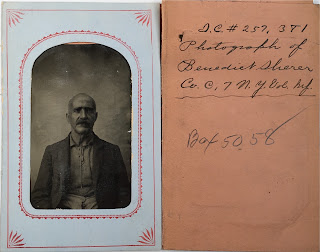Decorated by the Enemy!
This film (it is a full length movie) was difficult to watch but I wanted to see it as it relates to a family member who participated in the Battle of the Somme. It meant even more to me when I saw the scenes of the wounded in No Man’s Land and the medics who tried to help them. As far as I know none of my direct ancestors fought in WWI but my great grandfather’s cousin, Cyril Gardner was among those who never came home. He fought at Beaumont Hamel during the Battle of the Somme and was among the injured who weren’t counted at roll call the next day. When I first heard about Cyril the story I had found told that he was believed to have been the only allied soldier decorated on the field of battle by the enemy. My first thought was “leave it to my family be known for something like this.” But as I would soon discover, Cyril was an inspiration, not only for his time, but for ours as well.
Cyril Gardner wasn’t an American. He was a Newfoundlander, a British subject at the time. He joined the Royal Newfoundland Regiment (RNR) in December 1914. He served at Gallipoli and elsewhere before embarking for Beaumont Hamel. On that fateful day, July 1, 1916, nearly 90% of the RNR soldiers at Beaumont Hamel were injured, killed or missing and didn’t answer roll call the next day. Cyril, his brother and his cousin were among those who didn’t answer. His brother was killed, his cousin died 10 days later of his wounds, but Cyril recovered and returned to his battalion to continue fighting until he died of wounds suffered at Vimy Ridge on April 17, 1917. While serving, he was awarded the Distinguished Conduct Medal and the additional bar for acts of gallantry in battle. He also received an Iron Cross from a German officer!
According to his military records, the medals from his own country were for his role, along with two other soldiers, in capturing an officer and fifteen men of a bombing party during the battles at Guedencourt and Le Transloy.
The incident that lead to his being given the Iron Cross is only partially told in his official record and in news accounts. We’re told that Cyril had gone out on his own leading a party of stretcher-bearers into No Man’s Land to recover the wounded. Taking a revolver from one of the dead and approaching cautiously, he convinced a German officer that everyone else had surrendered so the German brought his own company out unarmed. This is where the official record and the newspaper accounts of the time end the story, but there is more to be told. While marching the company back to camp they came upon a British officer superior to Cyril. The British officer congratulated Cyril on the capture, then raised his own weapon planning to fire on the prisoners. Risking court martial or even being shot on the spot, Cyril stepped into the officer’s line of fire and told him that if even one of the prisoners was shot, he, the officer, would be the next to die. The officer hesitated only a moment before stepping down and walking away. At this point the senior German officer among the prisoners stepped forward, removed the Iron Cross from his own uniform and pinned it on Cyril. Today, the Iron Cross remains in the possession of Cyril’s great nephew.
On this Memorial Day as Americans debate the meaning of patriotism and argue about respect for the flag and our national anthem, let’s take a moment to think about what those two things are intended to symbolize and not confuse the symbol with that which it represents. We grew up pledging allegiance to a flag that is intended to symbolize a nation where there should be liberty and justice for all. My great grandfather’s cousin Cyril knew what it meant to stand for justice for all, even our enemies, and even in the face of great personal risk. Today, we remember those who gave the ultimate sacrifice for a country that espouses those ideals. Memorial Day is not about a flag, it is not about an anthem, it is about those who took the risk and gave the ultimate sacrifice for that fundamental right to liberty and justice upon which this country was founded. As we pause to honor them, let’s think about what we would’ve done in Cyril’s shoes, and what we do today in seeking that elusive ideal of justice for all.


Comments
Post a Comment